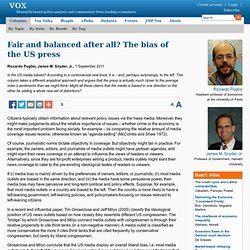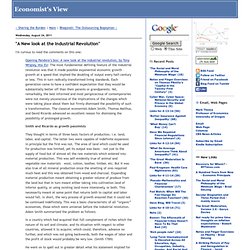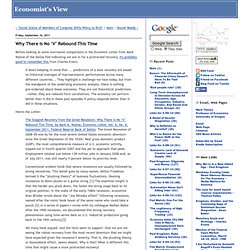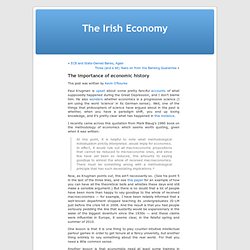

Fair and balanced after all? The bias of the US press. Fair and balanced after all? The bias of the US press. Riccardo Puglisi, James M.

Snyder, Jr., 1 September 2011 Citizens typically obtain information about relevant policy issues via the mass media. Moreover, they might make judgements about the relative importance of issues – whether crime or the economy is the most important problem facing society, for example – by comparing the relative amount of media coverage issues receive, otherwise known as “agenda-setting” (McCombs and Shaw 1972). Of course, journalistic norms dictate objectivity in coverage. But objectivity might fail in practice. If (i) media bias is mainly driven by the preferences of owners, editors, or journalists, (ii) most media outlets are biased in the same direction, and (iii) the media have some persuasive power, then media bias may have pervasive and long-term political and policy effects. Groseclose and Milyo conclude that the US media display an overall liberal bias, i.e. most media outlets are to the left of the average American voter.
Figure 1 Figure 2. "A New look at the Industrial Revolution" I'm curious to read the comments on this one: Opening Pandora’s box: A new look at the industrial revolution, by Tony Wrigley, Vox EU : The most fundamental defining feature of the industrial revolution was that it made possible exponential economic growth – growth at a speed that implied the doubling of output every half-century or less. This in turn radically transformed living standards. Each generation came to have a confident expectation that they would be substantially better off than their parents or grandparents.
A New look at the Industrial Revolution" I'm curious to read the comments on this one: Opening Pandora’s box: A new look at the industrial revolution, by Tony Wrigley, Vox EU: The most fundamental defining feature of the industrial revolution was that it made possible exponential economic growth – growth at a speed that implied the doubling of output every half-century or less.

This in turn radically transformed living standards. Each generation came to have a confident expectation that they would be substantially better off than their parents or grandparents. Why Lagarde is right: Bank recapitalisation is the best strategy. Harald Hau, 2 September 2011.

Why Lagarde is right: Bank recapitalisation is the best strategy. Why There Is No ‘V’ Rebound This Time. Before looking at some worrisome comparisons in the Economic Letter from Mark Wynne of the Dallas Fed indicating we are in for a protracted recovery, it's probably good to remember this from Charles Evans: It bears keeping in mind that ... predictions of a slow recovery are based on historical averages of macroeconomic performances across many different countries...

They highlight a challenge we face today, but from the standpoint of the underlying economic analysis, there is nothing pre-ordained about these outcomes. They are not theoretical predictions—rather, they are reduced form correlations. Why There Is No ‘V’ Rebound This Time. Before looking at some worrisome comparisons in the Economic Letter from Mark Wynne of the Dallas Fed indicating we are in for a protracted recovery, it's probably good to remember this from Charles Evans: It bears keeping in mind that ... predictions of a slow recovery are based on historical averages of macroeconomic performances across many different countries...

They highlight a challenge we face today, but from the standpoint of the underlying economic analysis, there is nothing pre-ordained about these outcomes. They are not theoretical predictions—rather, they are reduced form correlations. "A Genuine Revolution in Human Thinking" Marshall and Keynes brought about "a genuine revolution in human thinking": ...Alfred Marshall, the man most responsible for Keynes’s career choice, was also the one most responsible for the new way of thinking.
To paraphrase a great American economist, Paul Samuelson: before Marshall, economics was about what you couldn’t change. John Maynard Keynes - His sunny optimism shaped economists’ approach to depression. Bundesverfassungsgericht hilft Bundesregierung bei der Griechenlandhilfe aus der Patsche und erhebt die Maastricht-Regeln auf Verfassungsrang. Durch eine eigenmächtige Umdeutung des Wortlauts des Euro-Stabilitätsgesetzes retten die Karlsruher Richter die Bundesregierung vor dem politischen Desaster, bei der Griechenlandhilfe gegenüber den europäischen Partnern einen Rückzieher machen zu müssen.

Andererseits erhebt das höchste Gericht die dem Maastricht-Vertrag zugrundeliegende ökonomische Lehre des Monetarismus geradezu auf Verfassungsrang und verbaut damit einer makroökonomischen Zusammenarbeit auf dem Feld der Finanz- oder Wirtschaftspolitik in einer Währungsunion unter Berufung auf das Grundgesetz den Weg. Von Wolfgang Lieb Das Bundesverfassungsgericht hat die Verfassungsbeschwerden der fünf Euro-Gegner Wilhelm Hankel, Wilhelm Nölling, Karl Albrecht Schachtschneider, Dieter Spethmann und Joachim Starbatty und Peter Gauweiler zurückgewiesen. Um so mehr wird das Haushaltsrechts des Parlaments in den Verfassungshimmel gehoben: Das Budgetrecht des Parlaments stelle ein zentrales Element demokratischer Willensbildung dar. Bundesverfassungsgericht hilft Bundesregierung bei der Griechenlandhilfe aus der Patsche und erhebt die Maastricht-Regeln auf Verfassungsrang
8.

September 2011 um 10:51 Uhr. A Review of Margaret Atwood's Payback: Debt And The Shadow Side of Wealth. The Way of All Debt by John Gray. Payback: Debt and the Shadow Side of Wealth by Margaret Atwood Toronto: House of Anansi, 230 pp., $15.95 (paper) A perturbation arising from the American market in subprime mortgages has spread through the banking system to disrupt economic activity throughout the world.

The pattern of cause and effect will be debated for many years, with historians asking when and how the global economy was set on the path that led to its current condition. "The Importance of Economic History" The importance of economic history. Paul Krugman is upset about some pretty fanciful accounts of what supposedly happened during the Great Depression, and I don’t blame him.

He also wonders whether economics is a progressive science (I am using the word ’science’ in its German sense). Well, one of the things that philosophers of science have argued about in the past is whether, when you have a paradigm shift, you end up losing knowledge, and it’s pretty clear what has happened in this instance. I recently came across this quotation from Mark Blaug’s 1980 book on the methodology of economics which seems worth quoting, given when it was written: At this point, it is helpful to note what methodological individualism strictly interpreted…would imply for economics. In effect, it would rule out all macroeconomic propositions that cannot be reduced to microeconomic ones, and since few have yet been so reduced, this amounts to saying goodbye to almost the whole of received macroeconomics.